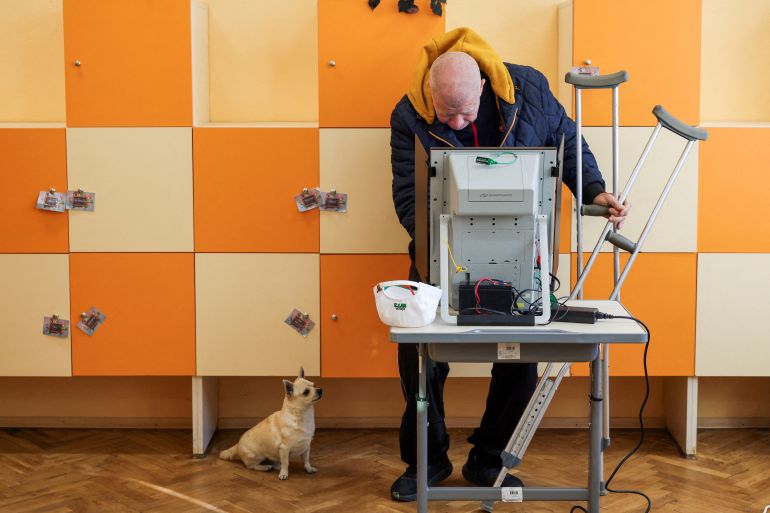Bulgarians vote in another election, but end to political deadlock unlikely
Opinion polls suggest no single party will win a parliamentary majority and there could be more coalition talks after the seventh vote in four years.
A man, with his dog, votes during the snap parliamentary election in Sofia, Bulgaria, October 27, 2024 [Stoyan Nenov/Reuters]Published On 27 Oct 202427 Oct 2024
Bulgarians are voting in their country’s seventh snap election in four years, with dim hope of an end to political turmoil that has favoured the country’s far right.
Opinion polls suggest no single party will win a majority in the vote on Sunday, likely ushering in yet more prolonged coalition talks.
Polls will close at 8pm (18:00 GMT), with exit polls due to be announced immediately. The first partial results are expected about midnight (22:00 GMT).
Bulgaria has had a succession of short-lived governments since 2020 when anticorruption protests helped end a coalition led by the centre-right GERB party, which brought down the cabinet of three-time Prime Minister Boyko Borissov.
Six consecutive votes so far have failed to yield a stable government. Sunday’s vote was triggered after an inconclusive June 9 election failed to bring agreement by Bulgaria’s political parties to form a coalition government.
Ex-PM Boyko Borissov of the GERB party votes at a polling station in Sofia [Stoyan Nenov/Reuters]
Voters are sceptical that Sunday’s election will end the political impasse in one of the poorest European Union member states.
“I don’t think they will form a government” after the election, Marin Kushev, 69, told the Reuters news agency after casting his ballot in the capital, Sofia. “I don’t believe them [politicians].”
“We’re fed up, that’s for sure,” 33-year-old IT worker Aneliya Ivanova told the AFP news agency. “We’re tired of being stuck in a carousel that goes round and round, and every time it’s the same result.”
A Gallup International Balkan poll, published on Friday by Bulgarian National Radio, put Borissov’s GERB party ahead with 26.1 percent of the vote, followed by two parties in a tight race for second place.
The reformist PP (We Continue the Change) and the ultranationalist Revival party were seen at 16.2 percent and 14.9 percent respectively. The same poll saw voter turnout at 31.1 percent.
PP has lost ground with each new snap vote. Revival, meanwhile, seems to have gained voter support after proposing a law banning LGBTQ “propaganda” that was passed by a large majority in parliament in August.
GERB also supported August’s anti-LGBTQ law, paving the way for a closer relationship with Revival, while Borissov has insisted that his “partners in Brussels and Washington won’t allow that”.
Bulgaria needs a period of a stable, well-functioning government to accelerate the flow of EU funds into its infrastructure and push it towards adopting the euro.
Plans to join the eurozone have already been pushed back twice because of missed inflation targets. Current accession plans are scheduled for January 25, 2025.
“A fragmented parliament and longstanding political rivalries will complicate the formation of a functional and stable government,” political risk consultancy Teneo said on Thursday.
“Protracted political chaos might translate into growing voter disappointment with mainstream political parties in favour of populist, nationalist and pro-Russian ones,” it added.
